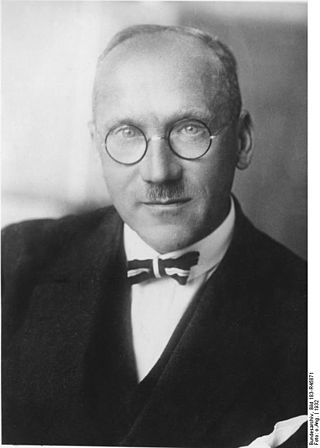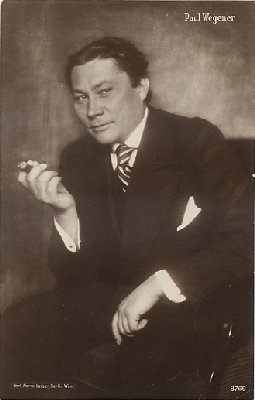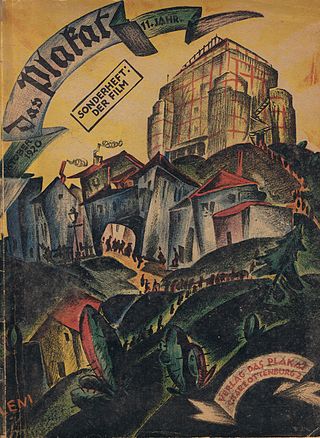Related Research Articles

Max Ernst was a German painter, sculptor, printmaker, graphic artist, and poet. A prolific artist, Ernst was a primary pioneer of the Dada movement and Surrealism in Europe. He had no formal artistic training, but his experimental attitude toward the making of art resulted in his invention of frottage—a technique that uses pencil rubbings of textured objects and relief surfaces to create images—and grattage, an analogous technique in which paint is scraped across canvas to reveal the imprints of the objects placed beneath. Ernst is noted for his unconventional drawing methods as well as for creating novels and pamphlets using the method of collages. He served as a soldier for four years during World War I, and this experience left him shocked, traumatised and critical of the modern world. During World War II he was designated an "undesirable foreigner" while living in France.

Max Reinhardt was an Austrian-born theatre and film director, intendant, and theatrical producer. With his radically innovative and avante garde stage productions, Reinhardt is regarded as one of the most prominent stage directors of the early 20th century.

Ernst Jünger was a German author, highly decorated soldier, philosopher, and entomologist who became publicly known for his World War I memoir Storm of Steel.

Ernst Ferdinand Sauerbruch was a German surgeon. His major work was on the use of negative-pressure chambers for surgery.

Paul Wegener was a German actor, writer, and film director known for his pioneering role in German expressionist cinema.

Luther is a 1928 German film about the life of Martin Luther, father of the Protestant Reformation.
The Stern Conservatory was a private music school in Berlin with many distinguished tutors and alumni. The school is now part of Berlin University of the Arts.
Events in the year 1932 in Germany.
Events in the year 1891 in Germany.
Events in the year 1882 in Germany.
What a Woman Dreams of in Springtime is a 1929 German silent comedy film directed by Curt Blachnitzky and starring Paul Rehkopf, Anna Müller-Lincke and Colette Brettel. The film's art direction was by Kurt Richter.

Money on the Street is a 1930 Austrian-German romantic comedy film directed by Georg Jacoby and starring Lydia Pollman, Georg Alexander, and Franz Schafheitlin. It is notable for the screen debut of Hedy Lamarr, who played a small role as an extra.
Ernst Stern was a Romanian-German scenic designer who, through his collaborations with most of the prominent German directors of the early 20th century, helped define the aesthetic of expressionism in both the theatre and the cinema.
Otto Bernheimer was a German collector of art, and an antique dealer.
Events in the year 2001 in Germany.

The Tiger Murder Case is a 1930 German mystery film directed by Johannes Meyer and starring Charlotte Susa, Harry Frank and Hertha von Walther. It was shot at the Babelsberg Studios in Berlin. The film's sets were designed by the art director Willi Herrmann.

Monika Vogelsang is a 1920 German silent historical drama film directed by Rudolf Biebrach and starring Henny Porten, Paul Hartmann and Ernst Deutsch.

Europe, General Delivery or Europe poste restante is a 1918 German silent mystery film directed by Ewald André Dupont and starring Max Landa, Viktor Senger and Lu Synd. It was part of a series of films starring Joe Deebs, a fiction British detective modelled on Sherlock Holmes. It marked Dupont's directorial debut.
Paula Barra was a German film actress. She starred in several films including the 1918 Max Nivelli film Pathways to Life, the 1919 film The Peace Rider, and the 1920 film The Air Pirates

Das Plakat was a design and art magazine published from 1910 to 1922 in Berlin, Weimar Germany. It was one of the early and influential publications on the art of posters and commercial art.
References
- ↑ "German Films Website". Filmportal.de.
- ↑ "Lebensbahnen (1918) - Pathways of Life". April 26, 2018.
- ↑ Erste Internationale Film-Zeitung, July 1918
- ↑ Hamburger Nachrichten, July 13, 1918
- ↑ Deutscher Reichsanzeiger – Königlich Preuβischer Staatsanzeiger, Berlin, July 20, 1918
- ↑ The Cinematograph (603), July 24, 1918
- ↑ "Der Film magazine". Der Film - Nr. 19/1918.